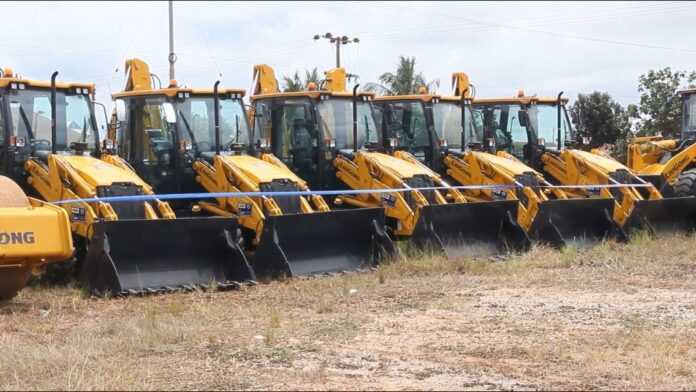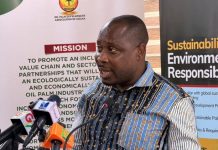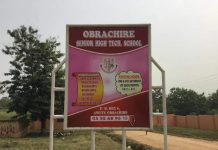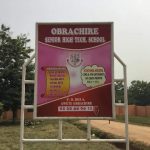To enhance road infrastructure in the Bono region, the government has delivered 96 trucks and earth-moving machines as part of the District Road Improvement Programme (DRIP).

The handover took place in New Dormaa, Sunyani, on Wednesday, August 21, 2024.
The new equipment includes 12 tipper trucks, 12 graders, 12 backhoes, 12 water tankers, 12 rollers, 12 wheel loaders, 6 bulldozers, 3 low beds, 3 concrete mixers, and 24 additional trucks.
This initiative aims to rehabilitate and maintain roads in the Bono region, reflecting the government’s commitment to enhancing transportation networks in rural areas and fostering economic development.
The delivery of trucks and earth-moving equipment marks a major advancement in the government’s efforts to enhance road infrastructure nationwide.
The equipment will be allocated to all twelve districts in the Bono region to initiate road improvement projects.
During the official re-launch of the District Road Improvement Programme, Bono Regional Minister Justina Owusu Banahene underscored the crucial role of road maintenance and upgrades in the Bono region.
She emphasized that these improvements will facilitate the movement of goods and people, improve road safety, and reduce travel times for residents.

” 2022/2023 was a year of roads and this is the continuity, now the year of roads in the hands of the region RCC, and the assemblies and with these machines all the corner corners, every area will be accessible.
Especially those roads that lead to farms, small communities where food and farm produce whether cash crops or food crops and many other things can be transported to the market and then again where small cars, motokings, bicycles and other things will be able to access so that when somebody is sick they can bring the person to the big community for him or her to access medical attention,” she said.
According to her government’s commitment to improving road infrastructure in the Bono region is a positive development that will benefit residents and businesses in the area. ” These machines can employ more than three hundred (300) people in the region, again the assemblies and all other stakeholders will also come onboard and we are also going to have some committees who will be checkers of these equipment, so indirectly we will have other people too who will be employed onboard,” she added.
The District Chief Executive for Dormaa East, Emmanuel Kofi Agyemang, expressed his gratitude for the government’s investment in road infrastructure.
He highlighted that improved roads will enhance connectivity, stimulate economic growth, and raise the quality of life for residents.
“The arrival of these machines is a significant relief for us, as well as for farmers and commuters,” he noted.
Agyemang also pointed out the high costs associated with repairing and maintaining roads, explaining that without adequate funds, hiring or contracting work can be prohibitively expensive and time-consuming.
Emmanuel Abasiya, Bono Regional Coordinator of Zoomlion Ghana Limited, outlined measures to ensure the equipment’s optimal performance and maintenance.
He revealed that 32 mobile service vans equipped with specialized tools have been deployed for 24/7 support.
Additionally, Zoomlion’s workshops in all 16 regions, along with tracking and telematics devices, will provide comprehensive after-sales services.
A state-of-the-art call center will handle equipment tracking and complaint management across all 261 districts.
J. A. Plant Pool has collaborated with the 48 Engineering Regiment of the Ghana Armed Forces to ensure the security and disciplined use of the equipment.
This partnership is designed to maximize efficiency and accountability in the operation of the District Road Improvement Programme (DRIP).
On July 31, 2024, President Nana Addo Dankwa Akufo-Addo launched the DRIP, a flagship initiative focused on enhancing decentralization and empowering local authorities.
The program aims to address the poor condition of many rural roads, which impede community connectivity and trade, while improving the overall quality of life for Ghanaians.
























































![[FREE FREE MONEY] Predict and Win a Guaranteed GH¢200 From Us EVERY WEEK](https://wordpress.ghanatalksradio.com/wp-content/uploads/2022/02/Predict-and-Win-Final-09-03-2021-218x150.jpg)
![[Predict & Win – 8th/Oct.] WIN A Guaranteed ¢200 From Us This Week](https://wordpress.ghanatalksradio.com/wp-content/uploads/2021/10/maxresdefault-16-218x150.jpg)
![[Predict & Win – 2nd] WIN A Guaranteed ¢200 From Us This Week](https://wordpress.ghanatalksradio.com/wp-content/uploads/2021/09/maxresdefault-50-218x150.jpg)
![[Predict & Win – 25th] WIN A Guaranteed ¢200 From Us This Week](https://wordpress.ghanatalksradio.com/wp-content/uploads/2021/09/maxresdefault-36-218x150.jpg)
![[Predict & Win – 18th] WIN A Guaranteed ¢200 From Us This Week](https://wordpress.ghanatalksradio.com/wp-content/uploads/2021/09/maxresdefault-23-218x150.jpg)









![[National cathedral] See full list of churches that have contributed since 2018](https://wordpress.ghanatalksradio.com/wp-content/uploads/2020/09/Ghana-National-Cathedral-GhanaTalksRadio-100x70.jpg)



